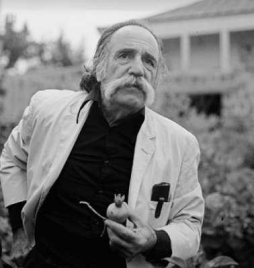William Saroyan
Wednesday, May 15, 2024
William Saroyan was an Armenian-American novelist, playwright, and short-story writer. He was awarded the Pulitzer Prize for Drama in 1940, and in 1943 won the Academy Award for Best Story for the film The Human Comedy. When the studio rejected his original 240-page treatment, he turned it into a novel, The Human Comedy.
Saroyan wrote extensively about the Armenian immigrant life in California. Many of his stories and plays are set in his native Fresno. Some of his best-known works are The Time of Your Life, My Name Is Aram and My Heart's in the Highlands.
He has been described in a Dickinson College news release as "one of the most prominent literary figures of the mid-20th century" and by Stephen Fry as "one of the most underrated writers of the [20th] century." Fry suggests that "he takes his place naturally alongside Hemingway, Steinbeck and Faulkner". Kurt Vonnegut has said that Saroyan was "the first and still the greatest of all the American minimalists.
William Saroyan was born on August 31, 1908, in Fresno, California, to Armenak and Takuhi Saroyan, Armenian immigrants from Bitlis, Ottoman Empire. His father came to New York in 1905 and started preaching in Armenian Apostolic churches.
At the age of three, after his father's death, Saroyan, along with his brother and sister, was placed in an orphanage in Oakland, California. He later went on to describe his experience in the orphanage in his writings. Five years later, the family reunited in Fresno, where his mother, Takuhi, had already secured work at a cannery. He continued his education on his own, supporting himself with jobs, such as working as an office manager for the San Francisco Telegraph Company.
Saroyan decided to become a writer after his mother showed him some of his father's writings. A few of his early short articles were published in Overland Monthly. His first stories appeared in the 1930s. Among these was "The Broken Wheel", written under the name Sirak Goryan and published in the Armenian journal Hairenik in 1933. Many of Saroyan's stories were based on his childhood experiences among the Armenian-American fruit growers of the San Joaquin Valley or dealt with the rootlessness of the immigrant. The short story collection My Name is Aram (1940), an international bestseller, was about a young boy and the colorful characters of his immigrant family. It has been translated into many languages.
Saroyan had a correspondence with writer Sanora Babb that began in 1932 and ended in 1941, which grew into an unrequited love affair on Saroyan's part.
In 1943, Saroyan married actress Carol Grace (1924–2003; also known as Carol Marcus), with whom he had two children: Aram, who became an author and published a book about his father, and Lucy, who became an actress. By the late 1940s, Saroyan's drinking and gambling took a toll on his marriage, and in 1949, upon returning from an extended European trip, he filed for divorce. They remarried in 1951 and divorced again in 1952 with Marcus later claiming in her autobiography, Among the Porcupines: A Memoir, that Saroyan was abusive.
Saroyan died in Fresno, of prostate cancer at the age of 72. Half of his ashes were buried in California and the remainder in Armenia at the Komitas Pantheon near fellow artists such as composer Aram Khachaturian, painter Martiros Saryan, and film director Sergei Parajanov.




